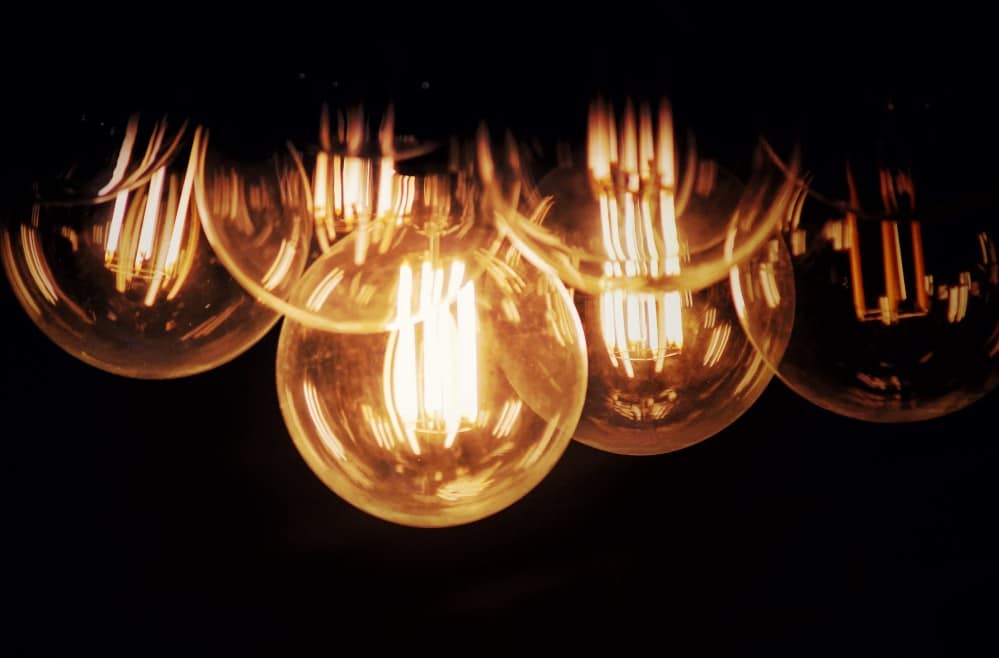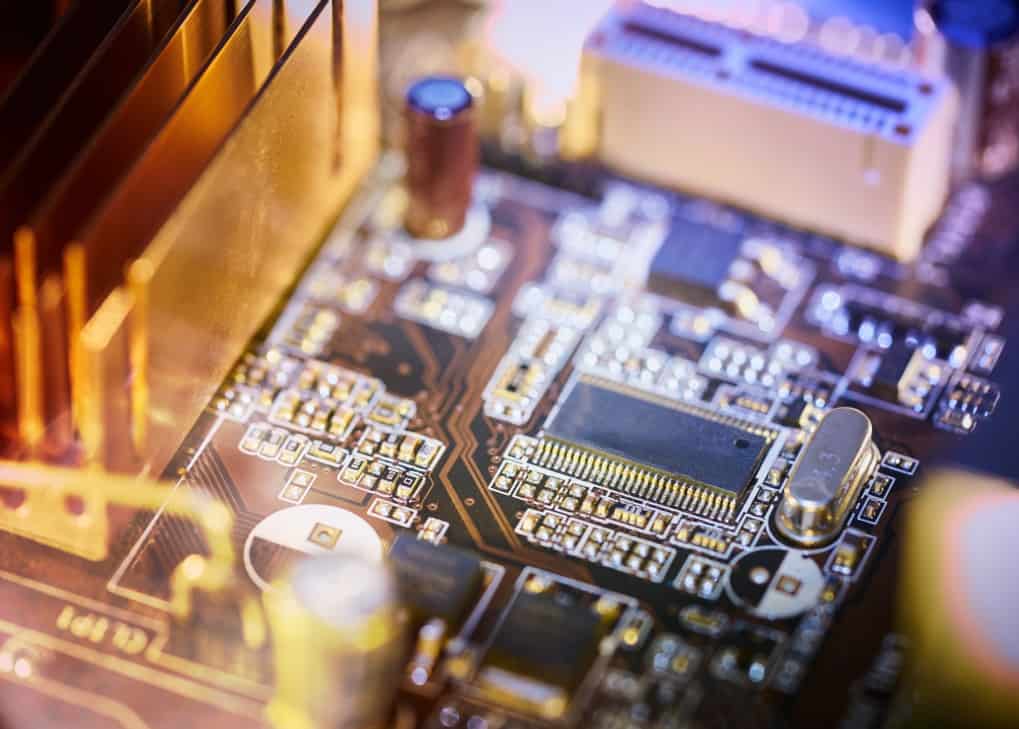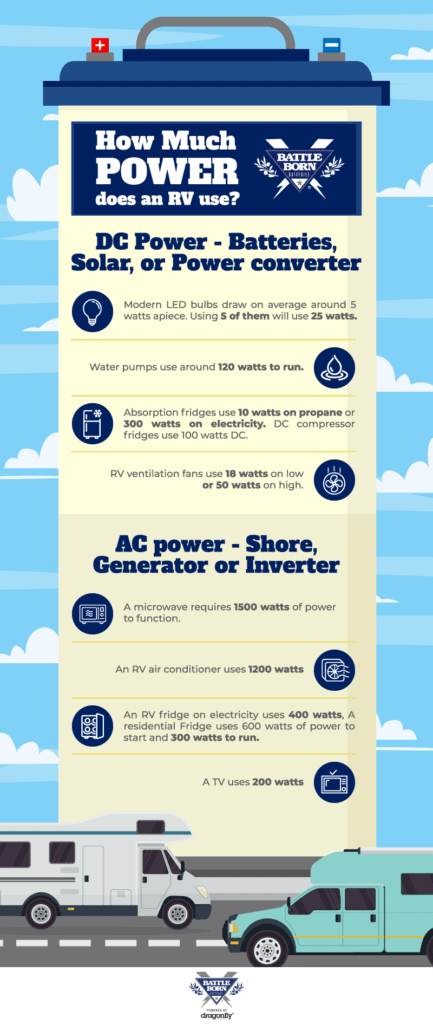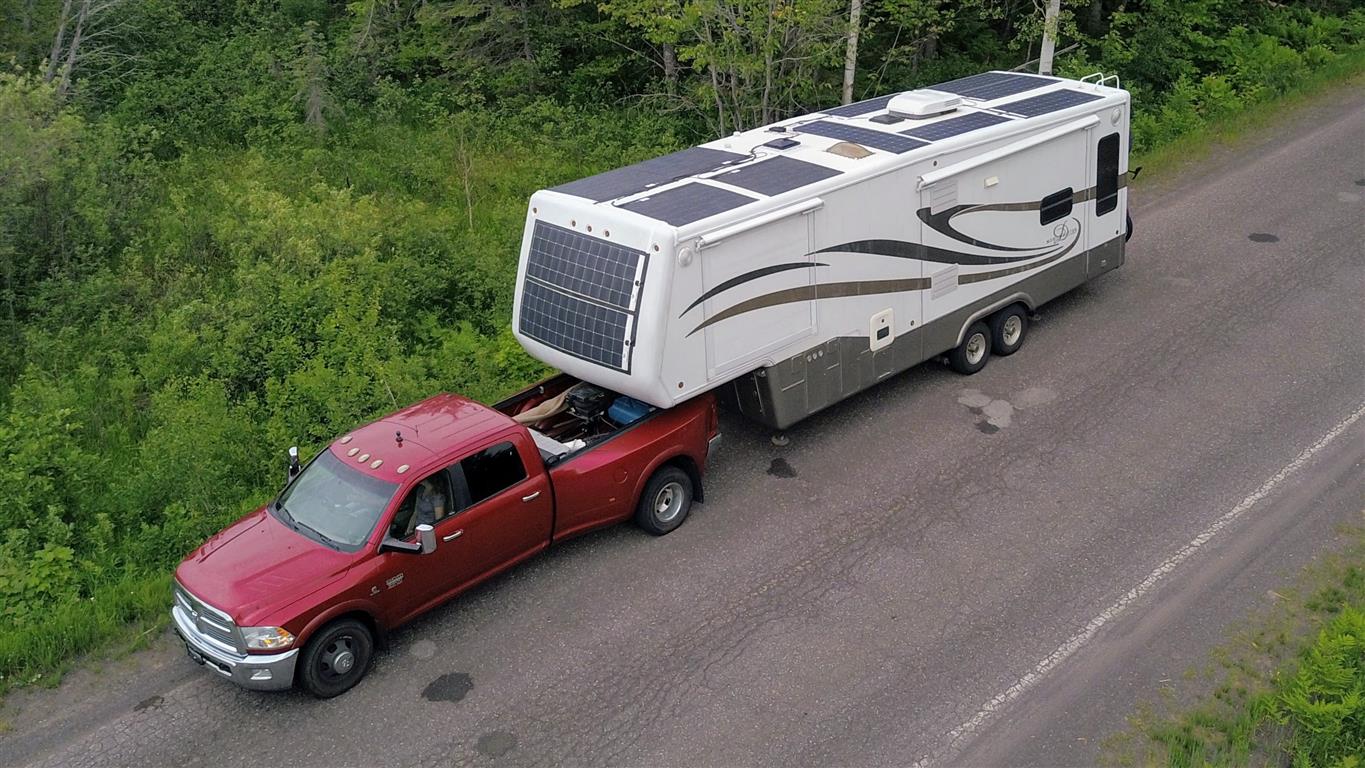
MENUMENU
TALK TO AN EXPERT
Special Hours: 7AM – 6PM PST
TALK TO AN EXPERT
Special Hours: 7AM – 6PM PST
How many watts does an refrigerator use?
Which consumes more power—a traditional halogen light bulb or a modern LED?
How much solar power do you need to run a fan all night on your boat?
Whether you realize it or not, watts affect nearly every electrical decision you make—day and night, on the road or on the water. From keeping food cold to staying cool, charging devices, or running an inverter, watts determine what your electrical system can and cannot do.
But what exactly is a watt? And why is understanding watts so important for RV, marine, and off-grid power systems?
If you’ve ever wondered why an inverter trips, a generator struggles, or your batteries don’t last as long as expected, the answer often comes back to watts. In this article, we’ll break down watts in simple terms and show you how they directly impact real-world applications like RV solar setups, boat electrical systems, and battery bank sizing—so you can design a system that actually supports your lifestyle.
A watt is a unit used to measure electrical power. In simple terms, watts tell you how fast electricity is being used or produced at any given moment.
Think of watts as the speed of energy use.
When an appliance or device is running, it’s either using a little power or a lot of power. The number of watts tells you exactly how much. The higher the wattage, the more power that device needs to operate.
For example:
So when we say an appliance “uses 750 watts,” what we’re really saying is that it needs 750 units of power every second while it’s running.

This is especially important in RVs, boats, and off-grid systems, where power is limited. Your batteries, inverter, generator, or solar system must be able to supply that many watts on demand.
If you have solar panels on the roof of your RV or boat, their output is also measured in watts. A 200-watt solar panel can produce up to 200 watts of power under ideal conditions. That power then flows into your battery bank to be stored and used later.
In short:
Once you understand watts things start to make alot more sense in terms of power.
In the same way, if you have solar panels on the roof of your RV, the solar energy that flows into your RV is measured in – you guessed it – watts!
Because electrical systems range from tiny electronics to massive infrastructure, watts are commonly grouped into multiples by 1000. You’ve probably heard these terms before, but understanding what they actually represent helps put power consumption into perspective.
A milliwatt is one-thousandth of a watt (0.001 W).
Milliwatts are used to measure extremely small power draws, like those found in electronics and micro-circuits. For example:
These power levels are so small that they’re usually insignificant in energy planning on a day-to-day use but they help illustrate just how wide the range of electrical power can be.

This is the most common unit you’ll see on everyday appliances and devices.
Examples include:
Most RV and boat appliances lights, fans, refrigerators, electronics—are rated in watts. This is the range you’ll spend the most time thinking about when planning your battery bank, inverter size, and solar capacity.
A kilowatt equals 1,000 watts.
Kilowatts are typically used for higher-power appliances and systems:
For example, a device rated at 4 kW is using 4,000 watts of power. This is also why utility companies bill electricity usage in kilowatts and kilowatt-hours—because residential loads add up quickly.
In RV and marine systems, kilowatt-level loads are usually handled by inverters and generators, not directly by batteries alone.
A megawatt is 1,000 kilowatts, or 1,000,000 watts.
At this scale, we’re no longer talking about household or mobile power, we’re talking about industrial and infrastructure-level electricity:
While these numbers are far beyond RV or marine applications, they help illustrate that watts are simply a consistent way to measure power—whether it’s a tiny circuit board or a national power grid.
Here’s an important thing to understand right away:
Watts are not something you measure directly.
Instead, watts are calculated using two electrical properties that can be measured: amps and volts.
Both volts and amps can be measured directly using an electrical meter (often called a multimeter when it can read both).
Once you know those two values, calculating watts is simple.
For DC systems—like the 12-volt battery systems used in RVs and boats—the formula looks like this:
Watts = Amps × Volts
(W = A × V)
For example:
Then:
That device is using 60 watts of power while it’s running.
You may also see this written in a more technical form:
Power = Current × Voltage
(P = I × V)
It’s the same equation, just different symbols (Amps is I in engineering terms). As long as you remember watts = amps × volts, you’ll be in great shape for real-world system planning.
Wattage tells you how much power a device uses while it’s operating. The higher the wattage, the more power it consumes at that moment.
High-wattage devices use a lot of power in a short amount of time. These are typically appliances that convert electricity into heat, motion, or compression, such as microwaves, heaters, air conditioners, and hair dryers.
Because they draw so much power, high-wattage devices:
If your system isn’t designed to handle these loads, you may experience inverter shutdowns, tripped breakers, or rapidly depleted batteries.
Low-wattage devices use much less power and are ideal for off-grid operation. Things like LED lights, fans, and device chargers can run for long periods without placing significant strain on your electrical system.
This is why energy-efficient upgrades—like switching to LED lighting—are so valuable in RVs and boats. You get the same functionality while using a fraction of the power.
It’s also important to clear up a common misconception: a device doesn’t use less power just because it runs on a lower voltage.
A 120-watt device uses 120 watts whether it’s operating on 12 volts or 120 volts. The difference is how much current is required to deliver that power, which is why wiring size and inverter capacity matter so much in 12V systems.
Understanding which of your devices are high wattage and which are low wattage helps you plan what can run at the same time, avoid overloads, and design a system that balances comfort with efficiency.
The job of a power supply is to provide power to the connected device or appliance. So, it would make sense that the more power a device or appliance requires, the higher the wattage you’ll need from the power supply.
Higher wattage = more power.
When considering the capacity of your power supply, there’s one rule of thumb that’s important to remember. It’s better to have more power than you need because you shouldn’t run your power supply at 100% capacity.
For example, if you want to run a device that requires 100 watts, you would not use a 100-watt power supply. Why? As stated before, you don’t want to run your power supply at full capacity. Ideally, you’d want your power supply to have a wattage higher than 100 in this situation.
If you have a 250-watt power supply and you use it to run an appliance that requires 100 watts, that power supply will only put out the necessary 100 watts the appliance needs. Essentially, the power supply will not “overpower” the appliance.
When you’re traveling in an RV or on a boat, watts matter because you need to be able to calculate your daily power requirements. For marine applications, it’s helpful to know how powerful your motor needs to be based on the size of your boat. In RVs, you’ll need to understand what appliances you can power and whether you can power more than one appliance at a time.
For example, RVs are often powered using generators. If your generator puts out 4,000 watts of power, you’ll probably be able to run your RV’s air conditioner, microwave, and several small appliances, although maybe not all at once.

If you’re considering installing a solar system on your boat or RV, you need to be able to calculate how much power (how many watts) you use in 24 hours. This will help you understand how many solar panels you need (based on their wattage) to be able to sustain your daily usage. We’ll share how to calculate this at the end.
RVs and boats have many applications that require power, from lights to device chargers to fans and refrigerators. It’s important to understand how many watts you’ll consume in a day, and how you will recharge your batteries to store more energy for the next day.
Using lower-wattage devices where possible is key, especially when not connected to shore power (i.e. living off-grid). Let’s use lights as an example to illustrate the variations in power consumption.
Remember, watts = power!
An incandescent light bulb that illuminates at a level of 450 lumens will use 40 watts. On the other hand, an LED light illuminating at the same level will only use 4-5 watts. If you’re living off-grid, mostly on solar power, you’re probably concerned with your poƒer consumption. In this case, which light bulb would you prefer to have in your rig or on your boat? The LED bulb that uses only a few watts, of course!
When considering appliances that use more watts, you will likely need an inverter to run them. Inverters turn DC current into AC current to run certain appliances and devices.
DC current, or direct current, is the type of electrical current you receive from a battery (think powering an RV). AC current, or alternating current, is the type of electricity you receive from a power station (think powering a residential home).
An inverter needs to have sufficient capacity to power what you want it to power. So, in order to know what inverter you need, you have to know the wattage (starting and running) of the appliances you want to power. So again – watts matter!
Let’s go back to our refrigerator example from the beginning of this article. If your refrigerator’s starting capacity is 1,200 watts and the running capacity is 800 watts, a 750-watt inverter would be insufficient to run this appliance. Instead, you’d want an inverter with a larger capacity, say 1,500-watts.
One additional thing that needs to be considered with inverters is that most of them are rated in VA or volt amps. In AC circuits there is something called power factor that causes power to appear higher than the load is to the generator or source. Its a complicated topic but to account for this its typically good to add 20% additional margin to your loads to get an accurate power consumed.
Now let’s suppose you’re in the market for a portable generator to give your off-grid adventures a power boost. If you want to run an air conditioner in the summer heat, your generator is going to need to be able to deliver sufficient wattage to start and run that AC unit. This is true of everything you want to power.
And finally, if you’re looking at investing in solar panels to harness the power of the sun, you need to be able to calculate how many watts of solar energy you need to power your off-grid life. How many watts of solar you need will be determined by how many watts of solar you use.
The difference between watts and watt-hours is quite simple. You may recall that electrical power is measured in watts. Watts measure the rate of power at a particular moment in time.
A watt-hour measures the rate of power over a specific period of time – one hour.

Simply put, one watt-hour is equal to one watt of power flow over an hour. So, a 5-watt LED light bulb left on for one hour has used 5 watt-hours of energy.
To illustrate the significance of watts and watt-hours, let’s figure out how many watts of solar panels you would need to power your RV or boat off-grid.
First, make a list of all the electrical devices you’ll want to run. Then, write down the wattage of each device and how long you intend to run each one. Next, total the wattage of all devices by adding them all together, then total the running time of all devices.
Lastly, multiply those two totals together (total wattage x total projected running time). The result tells you how many watt-hours are required to power all of your electrical devices with solar panels.
Let’s say you’re planning to run all of your devices for 24 hours. If you have one solar panel rated at 250-watts, your panel could produce 6,000 watt-hours (or 6 kilowatt-hours) of power during that time (250 x 24 = 6,000). Meaning, if the total watt-hour requirement you calculated for all of your devices over a 24-hour period is more than 6,000, you would need more than one solar panel to accommodate your power needs.
The above is a very simplified method to figure out solar. But, there are many more factors that come into play when determining solar needs. Mortons on the Move wrote an in–depth article explaining some more accurate ways to figure out solar needs for an RV.

Watts are clearly very significant in any application where power is needed, whether that’s in a home, business, large facility, boat, or RV. Simply stated, watts matter – and so does understanding them!
We know that building or upgrading an electrical system can be overwhelming, so we’re here to help. Our Reno, Nevada-based sales and customer service team is standing by at (855) 292-2831 to take your questions!
Also, join us on Facebook, Instagram, and YouTube to learn more about how lithium battery systems can power your lifestyle, see how others have built their systems, and gain the confidence to get out there and stay out there.
Shop Best Sellers








Ask a technical specialist now at 855.292.2831
Stay in the Know